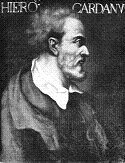

Girolamo Cardano was born on September 24, 1501 in the city of Pavia, in what is now Italy. Without a doubt, he is one of the most colorful characters in the early history of probability. Cardano's early training in mathematics probably came from his father, who was a lawyer by trade, but evidently an accomplished mathematician as well. Later, Cadano was educated at the universities of Pavia and Padua. He received a doctoral degree in medicine in 1525.
Cardano was a man of many interests and professions, including: law, medicine, astrology, and mathematics. Cardano published books on arithmetic and simple mensuration in 1537. The mathematical work that he is best known for, Ars Magna (The Great Art) was published in 1545. This book contains a variety of methods for solving polynomial equations, and anticipates the discovery of complex numbers. Additionally, Cardano wrote two encyclopedias of natural science. He achieved extraordinary fame as a physician, and indeed was considered one of the foremost scientists in Europe.
However, Cardano was also an avid and at times compulsive gambler, who squandered a significant part of his life and fortune on games of chance. On the positive side, his interest in gambling led to his mathematical study of probability. Cardano's book Liber de Ludo Aleae (The Book on Games of Chance), published after his death in 1663, contained perhaps the first mathematical analysis of gambling. In particular, Cardano formulated the fundamentally important concept of solving a probability problem by identifying a sample space with equally likely outcomes.
Cardano suffered a number of other tragedies as well. Cardano's son Giambatista poisoned his wife. Cardano was jailed briefly for heresy (in part for casting the horoscope of Jesus). Cardano supposedly predicted the date of his own death, a prediction that he perhaps ensured by suicide. In any event, Cardano died on September 21, 1576 in Rome.